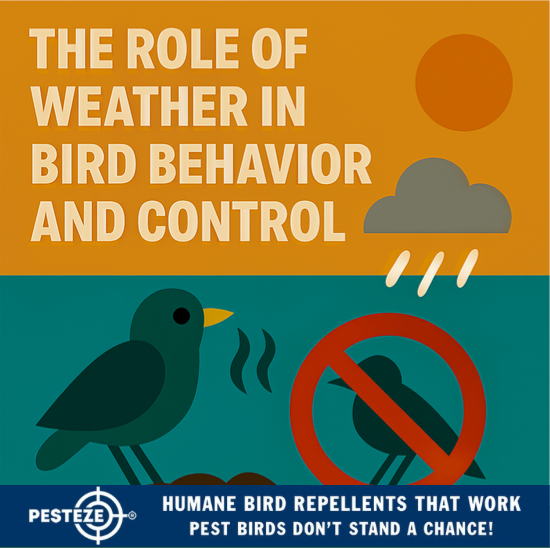THE ROLE OF WEATHER IN BIRD BEHAVIOR AND CONTROL

THE ROLE OF WEATHER IN BIRD BEHAVIOR AND CONTROL
SUMMARY
Weather patterns fundamentally influence bird behavior, migration, and population dynamics, creating critical insights for effective wildlife management strategies in 2025.
FEATURES
- Behavioral Insights: Comprehensive analysis of how weather impacts bird movement and activities.
- Predictive Management: Advanced strategies for anticipating and managing bird populations based on meteorological conditions.
- Adaptive Control: Techniques that respond to seasonal and climate-related bird behavior changes.
- Environmental Understanding: Scientific approach to bird population dynamics.
- Technological Innovation: Cutting-edge methods for weather-based bird management.
GUIDE DESCRIPTION
Weather represents a fundamental driver of bird behavior, influencing everything from daily activities to long-term population movements. Understanding the intricate relationship between meteorological conditions and avian populations provides critical insights for effective wildlife management.
Temperature, humidity, air pressure, and precipitation create complex environmental signals that guide bird behaviors. Migratory patterns, feeding habits, nesting choices, and territorial behaviors are all deeply influenced by subtle weather changes. This dynamic relationship requires sophisticated, adaptive approaches to bird management.
Technological innovations in 2025 offer unprecedented capabilities for weather-based bird behavior prediction. Advanced sensor networks, climate tracking systems, and machine learning algorithms provide detailed insights into how environmental conditions shape bird populations.
Seasonal variations create distinct challenges for bird control strategies. Winter conditions drive different behaviors compared to summer months, requiring flexible, adaptive management approaches that respond to changing environmental conditions.
Climate change introduces additional complexity to bird behavior management. Shifting weather patterns alter traditional migration routes, breeding cycles, and habitat preferences, demanding more sophisticated and responsive wildlife management techniques.
Key weather-related factors influencing bird behavior include:
- Temperature fluctuations
- Precipitation patterns
- Atmospheric pressure changes
- Wind conditions
- Seasonal light variations
Effective bird management must integrate:
- Meteorological data analysis
- Climate-responsive deterrence strategies
- Adaptive environmental modifications
- Ongoing population monitoring
- Pukhraj Sharma


Comments 0